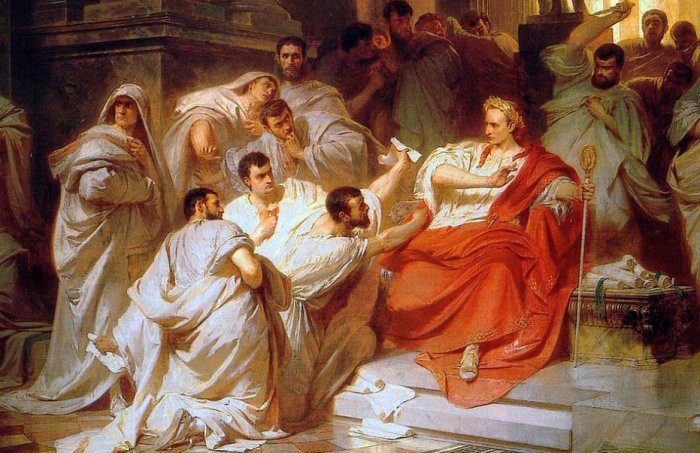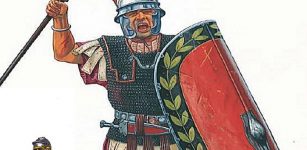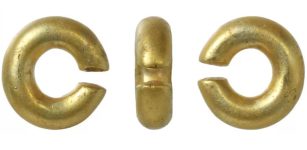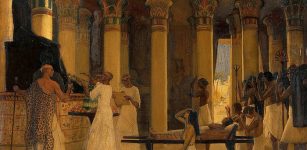On This Day In History: Julius Caesar Assassinated – On Mar 15, 44 BC
AncientPages.com - On March 15, 44 BC., Roman Dictator Julius Caesar was assassinated, not in the Senate but in a meeting room adjacent to the Theatre of Pompey.
The conspirators - Marcus Junius Brutus, Gaius Cassius Longinus, Decimus Junius Brutus, and several other Roman senators - left Caesar's body on the Senate floor at the foot of Pompey's statue.
The Murder of Caesar by Karl von Piloty, 1865, Lower Saxony State Museum. Image credit: Karl von Piloty - Public Domain
It lay there for a few hours before three enslaved people carried it to his wife.
Of the 23 wounds Caesar suffered, just one to the heart proved fatal, the physician Antistius determined.
There is no evidence that Caesar said anything as he lay dying, but in Shakespeare's play Julius Caesar, his dying words are
'Et tu, Brute?' ('You too, Brutus?') uttered his friend Marcus Brutus.
In early 44 B.C., Caesar became the most powerful man in Rome after defeating Pompey and his legions in a civil war. Many senators were annoyed at his unlimited power and feared that he had monarchical ambitions that seriously threatened the future of the Roman Republic.
Caesar further alienated the Senate when he failed to rise to greet a group of senators bestowing new honors upon him. It was this incident, according to the second-century historian Suetonius, "in particular that roused deadly hatred against him."
A group of senators, calling themselves the "Liberators," believed that Caesar had grown too powerful and needed to be killed. Among the conspirators was Marcus Junius Brutus, a descendant of Junius Brutus, who in 509 B.C. had killed Tarquin Superbus, the last king of Rome. Marcus Brutus was a close associate of Caesar but persuaded him to join the Liberators.
The conspirators decided they would attack "while he sat in the Senate, where he would be by himself since non-Senators would not be admitted, and where the many conspirators could hide their daggers beneath their togas," according to Nicolaus of Damascus, a Greek historian writing several years after the assassination.
They planned the murder on March 15, just days before Caesar was set to leave on a military campaign in Parthia.
Suetonius and Nicolaus wrote that a soothsayer had warned Caesar to beware of danger on the Ides of March—March 15. Before his death, Caesar encountered some bad omens, and his wife urged him to stay home. However, his trusted friend Brutus convinced him to "cast aside the forebodings of all these people and come," according to Nicolaus.
Marc Antony, Caesar's co-consul, heard a plot on Caesar's life and raced to the Senate to warn the dictator. However, as Brutus led Caesar into the Senate chamber, Anthony was delayed by Brutus Albinus, "who purposely engaged him in a lengthy conversation," according to the first-century Greek historian Plutarch.
When Caesar sat down, Senator Tillius Cimber stepped forward and tried to present him with a petition to end his brother's exile, but Caesar repeatedly rebuffed his request. Cimber then launched the conspirators' attack; Suetonius describes:
"Cimber caught his toga by both shoulders; then as Caesar cried, 'Why, this is violence!' one of the Cascas stabbed him from one side just below the throat."
Servilius Casca's blow caught Caesar in the neck but was not a resounding blow. According to Plutarch, Caesar exclaimed,
"You villain, Casca, what are you doing?"
Caesar tried to fight back against Casca, but he was immediately surrounded by the other conspirators, who had pulled out the daggers they had hidden in their togas. Plutarch wrote,
"Those who had prepared themselves for the murder bared each of them his dagger, and Caesar hemmed in on all sides, whichever way he turned to confront blows of weapons aimed at his face and eyes, driven hither and thither like a wild beast, was entangled in the hands of all."
Caesar was stabbed 23 times by the conspirators, including Brutus. According to Plutarch,
"When he saw that Brutus had drawn his dagger, he pulled his toga down over his head and sank, either by chance or because pushed there by his murderers, against the pedestal on which the statue of Pompey stood."
Suetonius recorded that he uttered "not a word, but merely a groan at the first stroke, though some had written that when Marcus Brutus rushed at him, he said in Greek, 'You too, my child?'"
The conspirators had hoped to restore the Roman Republic, but they failed. They were unable to restore the Roman Republic. The ramifications of the assassination led to the Liberators' civil war and, ultimately, to the Principate period of the Roman Empire.
AncientPages.com
Expand for referencesReferences:
Woolf G. Et Tu, Brute?: The Murder of Caesar and Political Assassination
Canfora L. Julius Caesar: The Life and Times of the People's Dictator





















